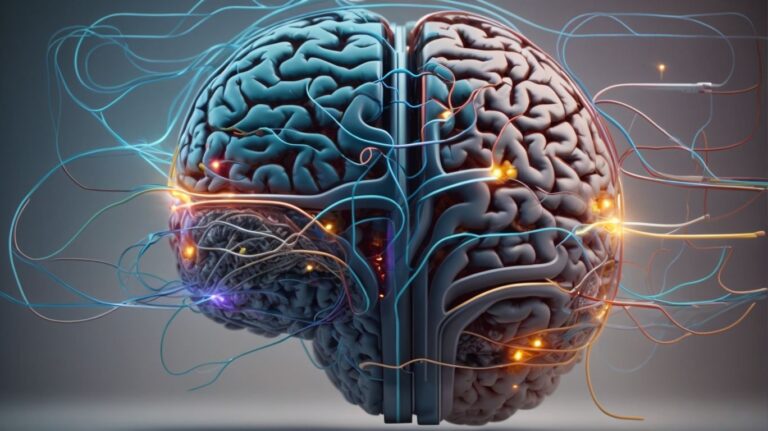Curious about the mysterious world of clairvoyance? In this article, we will dive into the intriguing phenomenon of clairvoyance and how it is perceived in psychology.
We will explore the different types of clairvoyance, possible explanations for this ability, and the common characteristics of clairvoyant individuals.
We will discuss the benefits of developing clairvoyance and provide practical tips on how to enhance your own clairvoyant abilities. Get ready to unlock the secrets of the mind and explore the realm of extrasensory perception.
Contents
- 1 What Is Clairvoyance?
- 2 How Is Clairvoyance Perceived in Psychology?
- 3 What Are the Possible Explanations for Clairvoyance?
- 4 What Are the Common Characteristics of Clairvoyant Individuals?
- 5 What Are the Benefits of Developing Clairvoyance?
- 6 How Can One Develop and Enhance Their Clairvoyant Abilities?
- 7 Frequently Asked Questions
- 7.1 What is clairvoyance in psychology?
- 7.2 How does clairvoyance differ from other psychic abilities?
- 7.3 Is there scientific evidence for clairvoyance in psychology?
- 7.4 Can anyone develop clairvoyance?
- 7.5 How does clairvoyance impact individuals and their mental health?
- 7.6 Is there a scientific explanation for clairvoyance?
What Is Clairvoyance?
Clairvoyance, often associated with paranormal phenomena, refers to the ability to gain information about an object, person, location, or event through extrasensory perception.
This psychic ability enables individuals to tap into a realm beyond the physical senses, allowing them to perceive things that are not visible to the naked eye. Retrocognition, a form of clairvoyance, involves the ability to see past events or occurrences. On the other hand, remote viewing is another aspect of clairvoyance where a person can perceive distant or unseen targets, transcending the limitations of time and space.
How Is Clairvoyance Perceived in Psychology?
Clairvoyance is a topic that has intrigued researchers in the field of psychology, prompting investigations into the validity and mechanisms of such phenomena.
Researchers in the scientific community have delved into studying clairvoyance from various angles, utilizing methodologies rooted in parapsychology to explore this elusive ability. Controlled experiments, such as remote viewing trials and precognition tests, have been conducted to assess the extent of individuals’ extrasensory perception capabilities. These efforts aim to decipher the underlying cognitive processes involved in clairvoyant experiences and evaluate the potential implications of such phenomena on our understanding of human consciousness and perception.
What Are the Different Types of Clairvoyance?
Various types of clairvoyance exist, including precognition, retrocognition, and remote viewing, each offering unique insights into past, present, or future events.
Precognition is the ability to perceive and predict events that have not yet happened, offering individuals glimpses into potential future outcomes. This form of clairvoyance is often associated with intuitive flashes, dreams, or a gut feeling about what is to come.
In contrast, retrocognition allows individuals to access information about past events that they have no prior knowledge of, providing a holistic view of history and past experiences.
Lastly, remote viewing enables individuals to mentally ‘see’ and describe distant or unseen objects and locations, transcending physical boundaries.
What Are the Possible Explanations for Clairvoyance?
The phenomenon of clairvoyance has intrigued scholars and skeptics alike, with possible explanations ranging from extrasensory perception (ESP) to subconscious perception and coincidence.
ESP, often associated with the ability to perceive information beyond the five senses, is a frequently cited hypothesis when exploring clairvoyant experiences.
Many believe that individuals who possess this form of cognitive ability can tap into a realm that goes beyond ordinary perception. Proponents of subconscious perception argue that our minds may process information at a subconscious level, allowing for seemingly clairvoyant occurrences.
Coincidence, on the other hand, attributes apparent clairvoyance to random chance alignments that create an illusion of foresight.
Extrasensory Perception (ESP)
Extrasensory Perception (ESP) is a prominent theory used to explain clairvoyant experiences, suggesting that individuals can perceive information through means beyond the five traditional senses.
These experiences often involve individuals sensing and interpreting information about people, places, or events that are not readily available to them through their senses. This phenomenon has long fascinated researchers, as it challenges our understanding of human perception and cognition.
To explore more about clairvoyance in psychology, visit this reputable source.
In the context of clairvoyance, individuals are believed to receive psychic impressions or insights about a person or situation, regardless of physical proximity or time. Such abilities are often associated with spiritual guidance, metaphysical beliefs, and a higher state of consciousness.
Subconscious Perception
Subconscious perception is another proposed explanation for clairvoyant abilities, suggesting that individuals may access information at a subconscious level without conscious awareness.
When diving into the realm of clairvoyance, the concept of subconscious perception unveils a fascinating layer of complexity. This theory posits that the subconscious mind, a reservoir of thoughts and memories beyond conscious reach, holds the key to unlocking hidden information.
In this context, apparitions and psychokinesis are often intertwined with the workings of the subconscious, leading to intriguing possibilities of the mind’s capabilities. The subtle cues, gut feelings, and intuitive flashes that clairvoyants experience may very well be manifestations of this deep-seated subconscious processing.
Coincidence
Coincidence is often cited as a skeptical explanation for apparent clairvoyant experiences, attributing such occurrences to random chance aligning with perceived psychic abilities.
When individuals experience events that seem to be predicted or influenced by unseen forces, the human tendency to seek patterns and connections can lead them to attribute these occurrences to precognition or clairvoyance. However, scientific skepticism maintains that these instances can be merely coincidental, with statistical probability accounting for supposed psychic phenomena.
In reality, the world is filled with countless random events and variables, creating opportunities for chance alignments that might appear as premonitions or psychic insight. The concept of confirmation bias further influences how individuals interpret these events, as they may selectively remember instances that confirm their belief in supernatural abilities while disregarding contradictory evidence.
What Are the Common Characteristics of Clairvoyant Individuals?
Clairvoyant individuals often exhibit heightened intuition, strong empathy, and a vivid imagination, traits that have been associated with renowned figures like saints throughout history.
These individuals possess a keen sense of perception that enables them to tap into information beyond the physical realm, much like how saints were believed to have direct communion with divine wisdom. Rudolf Steiner, a philosopher and clairvoyant, revered for his insights into spirituality, emphasized the importance of nurturing these innate intuitive abilities.
In the realm of mediums, renowned for their ability to communicate with spirits, the link between past, present, and future often blurs, showcasing a deep connection to the unseen world. Such individuals exemplify the profound depth of insight that clairvoyants can access through their extrasensory perception.
Heightened Intuition
Heightened intuition is a central characteristic of clairvoyant individuals, enabling them to perceive insights and information beyond the scope of ordinary senses.
When exploring the concept of heightened intuition in clairvoyance, it becomes evident that this ability plays a crucial role in deciphering hidden truths and uncovering mysteries that elude the grasp of conventional perception. Through their sharpened intuitive faculties, clairvoyants are said to tune into the energy fields surrounding individuals and objects, allowing them to tap into a deeper realm of knowledge and understanding.
Strong Empathy
Strong empathy is often observed in clairvoyant individuals, allowing them to connect deeply with others’ emotions and experiences, a quality that enhances their psychic insights.
This heightened sensitivity to emotions and energies enables psychic individuals to tap into the unseen realms, gaining profound insights that transcend the limitations of the physical world.
A renowned figure in the study of psychic phenomena, J. B. Rhine conducted groundbreaking research at Duke University, diving into the interconnectedness of empathy and clairvoyance. Through his work, he highlighted the intricate relationship between understanding others’ feelings and accessing higher levels of perception.
Vivid Imagination
A vivid imagination is a common trait among clairvoyant individuals, fueling their creative visualization and interpretation of psychic impressions and symbols.
To explore more about the phenomenon of clairvoyance in psychology, you can refer to this external link.
Through the power of imagination, clairvoyants tap into a realm beyond the physical, allowing them to perceive information through extrasensory means like remote sensing. This ability to visualize beyond the present moment is crucial in the development of psychic experiences.
In fact, studies conducted by the Stanford Research Institute have shown that individuals who exhibit strong imaginative skills often demonstrate higher levels of clairvoyant intuition. By combining creativity with a deep awareness of symbols and energies, clairvoyants can gain profound insights into past, present, and future events.
What Are the Benefits of Developing Clairvoyance?
Developing clairvoyant abilities can lead to improved decision-making, enhanced creativity, and increased spiritual awareness, offering individuals unique insights and perspectives.
When individuals hone their clairvoyant skills, they often find themselves equipped with the extraordinary gift of accessing information beyond the five senses.
This ability can prove invaluable in navigating intricate decisions that require a deeper understanding of the situation. Tapping into clairvoyance can unleash a surge of creativity, allowing innovative ideas to flow freely and unconventionally.
By connecting with the spiritual realm through clairvoyance, individuals may experience a profound sense of interconnectedness, finding solace and guidance in their spiritual journey.
Improved Decision Making
Enhanced decision-making is a notable benefit of developing clairvoyant abilities, as intuitive insights can provide valuable guidance and clarity in various situations.
By honing one’s clairvoyant skills, individuals can access a deeper level of understanding beyond surface information, tapping into subtle sensations and non-verbal cues that may not be immediately apparent. This heightened awareness can offer a more comprehensive perspective on complex issues, complementing traditional analytical approaches with a holistic viewpoint.
Enhanced Creativity
Developing clairvoyance can stimulate creativity by expanding imaginative capacities and fostering a deeper connection with symbols, visions, and intuitive interpretations.
Enhanced intuition, a key component of clairvoyant abilities, can provide individuals with unique insights into the subconscious mind and unlock the creative potential within. This heightened sense of awareness allows one to tap into a reservoir of ideas that may not have been accessible through conventional means. By harnessing cognitive processes and psychokinetic energies, individuals can channel their inner visions into innovative solutions and artistic manifestations. The interplay between clairvoyance and creativity offers a rich tapestry of inspiration for those seeking to explore the depths of the mind and unleash their creative forces.
Increased Spiritual Awareness
Clairvoyance can elevate spiritual awareness by offering glimpses into unseen realms, fostering a deeper connection with metaphysical dimensions and heightened states of consciousness.
Individuals who possess clairvoyant abilities are believed to have the power to perceive information beyond the ordinary senses, tapping into the universal energy field that underlies all existence. This gift of insight can lead to profound experiences of revelation and enlightenment, guiding individuals on their spiritual journeys towards self-discovery and higher truths.
Clairvoyance has been a topic of interest and debate among researchers, skeptics, and believers for centuries. Figures such as Ivor Lloyd Tuckett and Joseph McCabe have contributed significantly to the discourse surrounding psychic phenomena, exploring the boundaries between science and spirituality.
How Can One Develop and Enhance Their Clairvoyant Abilities?
Developing and enhancing clairvoyant abilities often involves practices such as meditation, intuition exercises, and seeking guidance from experienced clairvoyants to nurture psychic potential.
Connecting with your inner self through meditation can help in achieving a state of heightened awareness, allowing for a deeper understanding of the spiritual realm.
Intuition exercises, like practicing visualization and tuning into subtle energies, can sharpen your psychic senses and enhance precognition.
Aligning with mentors who have honed their clairvoyant skills over time can provide invaluable insights, guidance, and support, especially when facing spiritual skepticism or doubts.
Embracing these strategies can lead to a more profound connection with the spirit world and a greater sense of clarity and purpose in daily life.
Meditation and Mindfulness
Meditation and mindfulness practices are essential for developing clairvoyant abilities, as they enhance focus, clarity, and receptivity to psychic impressions and insights.
By cultivating a calm and centered mind through meditation, individuals can tap into their intuitive capabilities with greater ease. The practice of mindfulness not only sharpens psychic focus but also facilitates a deeper connection to subtle energies and spiritual realms. This enhanced awareness allows for a heightened receptivity to psychic information, making it easier to decipher symbols, images, and messages from the subconscious mind.
Practicing Intuition Exercises
Engaging in intuition exercises can strengthen clairvoyant abilities by encouraging participants to trust their intuitive insights, recognize psychic signals, and interpret subtle cues.
One effective exercise to improve clairvoyance is practicing meditation to quiet the mind and enhance receptivity to psychic information. Visualization techniques such as imagining a white light surrounding oneself can also help in developing the ability to see beyond the physical realm. Engaging in activities that promote mindfulness, like journaling dreams or practicing automatic writing, can further hone intuitive capacities.
Harold Puthoff and Russell Targ, well-known researchers in the field of parapsychology, have highlighted the significance of intentionality and mental focus in accessing psychic abilities. They emphasize the need for individuals to be open-minded and receptive to subtler forms of perception in order to tap into their clairvoyant potential.
Seeking Guidance from Experienced Clairvoyants
Seeking guidance from experienced clairvoyants and mentors can provide valuable insights, techniques, and support for individuals on the path to developing their psychic abilities.
Those who are mentored by seasoned practitioners like David Marks or Arthur Conan Doyle are often able to accelerate their psychic development due to the wealth of knowledge and wisdom that these mentors possess. Learning from such established figures in the field not only enhances one’s psychic skills but also helps in understanding the nuances of clairvoyance and the various ways it can manifest in one’s life.
Frequently Asked Questions
What is clairvoyance in psychology?
Clairvoyance, also known as “clear seeing,” refers to the ability to gain information about people, objects, events, or locations through extrasensory perception (ESP) without the use of the five physical senses. In psychology, it is considered a paranormal phenomenon and is often associated with psychic abilities.
How does clairvoyance differ from other psychic abilities?
While clairvoyance specifically involves the ability to “see” information, other psychic abilities such as clairaudience (clear hearing) and clairsentience (clear feeling) involve receiving information through other senses. Clairvoyance is also often associated with premonitions or visions of future events.
Is there scientific evidence for clairvoyance in psychology?
The existence of clairvoyance and other psychic abilities is a controversial topic in psychology. While there have been numerous anecdotal reports and studies on the topic, there is no conclusive scientific evidence to support the existence of these abilities. Many skeptics argue that any perceived instances of clairvoyance can be explained by chance or other psychological factors.
Can anyone develop clairvoyance?
There is no scientific evidence to suggest that clairvoyance can be developed in individuals. However, some people claim to have naturally occurring clairvoyant abilities, while others may believe they have developed the ability through spiritual practices or training. Ultimately, the ability to “see” information through extrasensory perception remains unproven and highly debated.
How does clairvoyance impact individuals and their mental health?
Individuals who believe they have clairvoyant abilities may experience feelings of isolation or being misunderstood by others. In some cases, individuals may also experience mental health concerns such as anxiety or delusion if they become overly fixated on their abilities. However, the impact of clairvoyance on mental health is not well-studied and varies greatly from person to person.
Is there a scientific explanation for clairvoyance?
The concept of clairvoyance is not currently supported by scientific research or evidence. In fact, many scientists and psychologists argue that the belief in clairvoyance is based on confirmation bias or the tendency to interpret information in a way that supports one’s beliefs. While there is no scientific explanation for clairvoyance, some believe that it may be related to the brain’s ability to make predictions based on past experiences and information.



